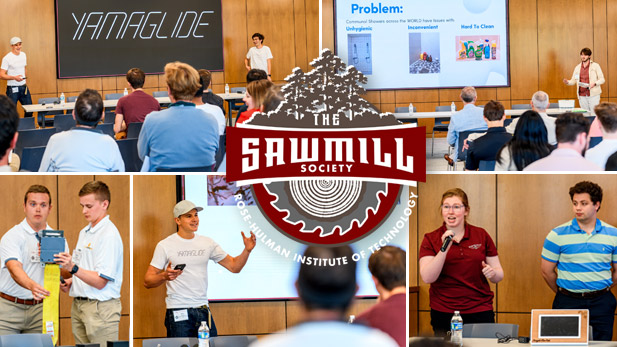Alumni Sawmill Society Supporting Students’ Entrepreneurial Ideas

In scenes resembling the “Shark Tank” TV show, student teams pitched their entrepreneurial product ideas to get feedback and possibly financial support from successful alumni during this spring’s Sawmill Society Weekend.
Successful alumni are encouraging the next generation of entrepreneurs by financially supporting and providing valuable mentorship to support creative and innovative technology ventures being fostered by current Rose-Hulman’s students and young graduates.
The institute’s Sawmill Society, a growing group of forward-thinking alumni and friends, has established Ventureship and Angel Network funds to help encourage projects with an entrepreneurial mindset to go from the drawing board to a prototype concept and, quite possibly, a viable business. This financial support can feature up to $6,000 that supports students in further developing their projects this summer or providing significant investment for alumni startups. (The Angel Network is not directly affiliated with Rose-Hulman and is an independent Sawmill Society enterprise.)
These efforts are part of Rose-Hulman’s growing entrepreneurial ecosystem that’s providing students with unique experiences in innovation, discovery, and entrepreneurship – one of four main themes of the Advancing by Design strategic plan.
A significant portion of this spring’s Sawmill Society Weekend had alumni entrepreneurs having engaging discussions with students about several startup ideas, many resulting from classroom projects, the Rose Innovative Student Entrepreneurs Club, the Kremer Innovation Center’s Make It Happen project development laboratory, and hand-drawn project concepts created during campus discussions. These projects included:
Yamaglide: A bold approach to battery-powered scooters, developed by sophomore mechanical engineering students Adam Jirovec and Shaun Yamamoto.
StrapTech: A wireless device that allows semi-truck drivers to better monitor the tension on cargo straps. This project by senior mechanical engineering students Ayden Ayres, Ike Farnsworth, and Ethan Rogers has received positive industry feedback and is undergoing further concept redesigns – in hopes of becoming a startup company. (This concept earned the William A. Kline Innovation Award at this year’s Rose Show.)
H2Organize: A unique shower caddy that can provide a cleaner and convenient shower experience. Project leader Deven Wells, a sophomore engineering design student, first developed this idea with classmates Joshua Bumpus, Josh McManus, and Ethan Schurr during this year’s Startup Weekend on campus. The concept has received positive feedback, along with some product orders, from prospective customers.
ReTiPrk: An innovative parking management solution is being developed by first-year students Hollin Glaze, Ahaan Kothari, Jonathan Reid, and John Webster. It utilizes computer vision technology to monitor the availability of spaces within a parking lot and may possibly reduce labor costs while enhancing ticket processing.
LOME – AI Generated Short-Term Content: Computer science and software engineering junior Christian Beadling utilized his tech skills to create an online software that streamlines the process of providing customized social media video content.
“I continue to be encouraged by the great ideas that students are developing in and out of the classroom, and the entrepreneurial spirit that’s growing across campus. The Sawmill Society wants to support students and alumni in realizing their dreams,” said Sawmill Society leader Tim Daniel, a 1981 electrical engineering alum who is a small business development coach.
The Sawmill Angel Network has provided financial assistance to assist startups by 2017 mechanical engineering alum Tim Balz, 2013 biomedical engineering/biochemistry and molecular biology alumna Tanya Colonna, and 2012 biomedical engineering/biochemistry and molecular biology graduate Hobey Tam.
Balz is co-founder and chief executive officer of Kalogon, a successful startup that’s invented the world’s first smart cushion that’s empowering people to lead active, seated lives.
Colonna is CEO of Oro Muscles, a startup that’s breaking boundaries by connecting muscle activity data to physical action. Tam is chief technology officer of the enterprise.
The Angel Network would like to assist other alumni in future endeavors, according to member Michael Hatfield, a 1984 electrical engineering graduate.
“We just need more proposals from alumni with concrete startups that are investment-worthy. We know that the ideas are out there,” he said.